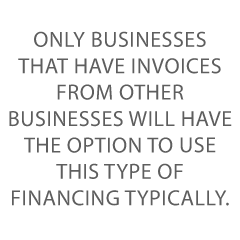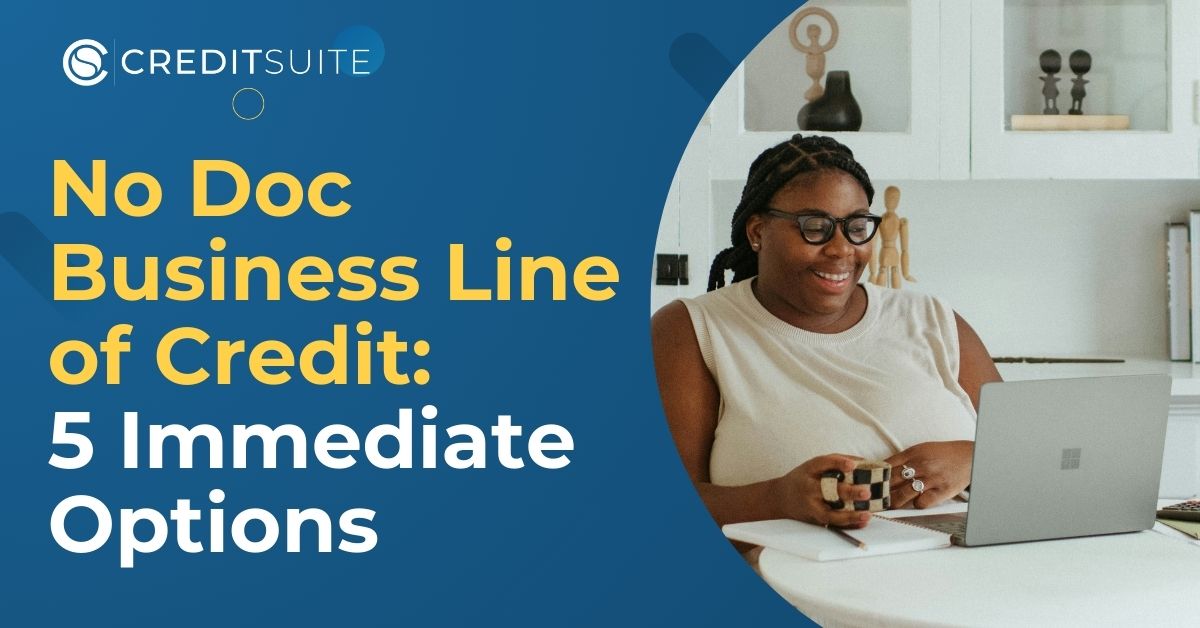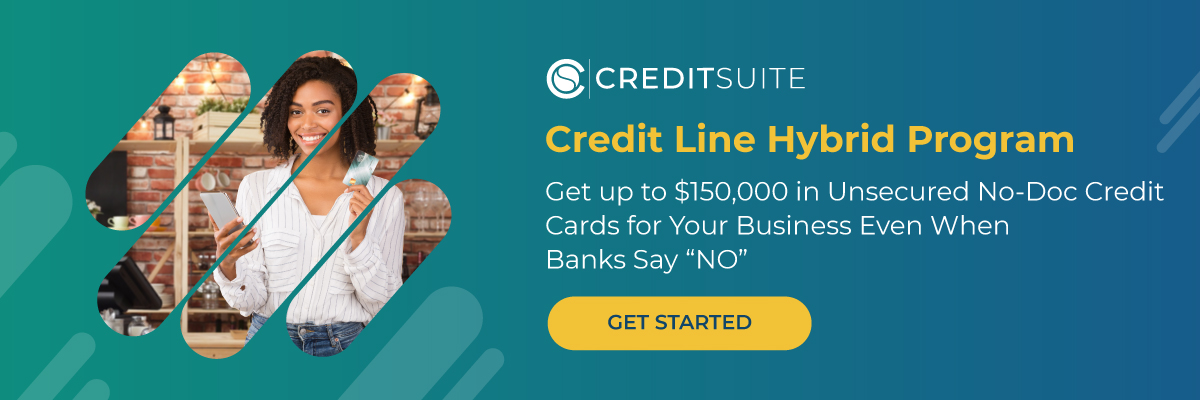A no doc business line of credit is a type of financing whereby you get a certain amount of money to spend. But you are only charged interest on the amount you are using. As a result, it behaves a lot like a business credit card, but without plastic.
The ‘no doc’ part of this particular kind of business line of credit means that a lender does not require you to submit the standard documents necessary for most small business loans and lines of credit.
That means no tax returns, financial statements, pay stubs, or the like. Approval is based on other factors.
This is in stark contrast to a traditional term loan from a credit union or bank, or loans backed by the Small Business Administration, which require a substantial number of documents during the application process.
1. Credit Line Hybrid
Credit Suite offers this particular form of business financing. This unsecured business line is a credit card stacking program that works similarly to a line of credit. It provides revolving, unsecured financing.
Our unique program allows you to fund your small business without putting up collateral. It is similar to an unsecured business loan, but you only pay back what you use.
To qualify, you need good personal credit. That is, your personal credit score should be at least 700. Also, you can’t have any liens, judgments, bankruptcies, or late payments.
Furthermore, in the past 6 months, you should have had fewer than 5 credit inquiries, and you should have less than a 45% balance on all business and personal credit cards.
If you do not meet all of the requirements, there are still options. We can help you figure out how to get where you need to be, and you can take on a credit partner who meets each of these requirements.
Many small business owners work with a friend or relative to fund their small business with this type of business line.
If a relative or a friend meets all of these requirements, they can partner with you to allow you to tap into their credit to access funding, similar to a co-signer on a small business loan.
The Credit Line Hybrid can be an excellent tool for managing cash flow and unexpected business expenses. It can also be utilized as a startup business loan.
2. Invoice Financing
Invoice financing is a way for businesses to access funds to cover dips in cash flow by selling their invoices to a third-party factoring company at a discount. Invoice factoring can be provided by independent finance providers, or even by banks.
It is mainly based on invoice amount and how reliable the account debtor is to a business seeking invoice financing. As a result, lenders generally will not have many, if any, document requests. It also functions more like a business line of credit than a business loan.
A small business owner’s credit score does not have to be super high to get this type of financing since it’s secured by the invoices. In most cases, you can get your cash fast.
There’s no collateral either. Invoice factoring relies on the companies that owe the borrower. If the lender is satisfied that they will honor their debt, then the lender will agree to provide cash, thus bridging your business cash flow.
 Only businesses that have invoices from other businesses will have the option to use this type of financing typically.
Only businesses that have invoices from other businesses will have the option to use this type of financing typically.
It works like this. When a small business offers payment terms to its customers, like net 30, the business has to wait for an invoice payment. Offering payment terms is a good business decision as it can be a deciding factor for customers.
But for the business, it means waiting for the payment to come through. The business, of course, has its own bills to pay. With invoice factoring, you get funds from those invoices right away.
You will collect less than the full value, but you will get the money faster.
3. Merchant Cash Advance
An MCA works well for established small businesses that are taking credit card payments. Basically, it’s a cash advance against expected credit card sales. Repayment is a percentage of daily sales paid for by credit card. It’s another great way to manage cash flow.
A small business can apply for a business cash advance against credit card payments and have funds deposited fairly quickly.
A merchant financing program is a business loan alternative that is ideal for small business owners who accept credit cards and are looking for fast and easy business financing.
It is designed to help them get funding, based strictly on cash flow as verifiable per business banks’ statements.
As a result, lenders in general will not ask for the documents that they would for a traditional business loan or small business line of credit.
MCA providers weigh risk and credit criteria differently from how a banker does. An MCA provider looks at a company’s daily credit card receipts. This is to determine if a business can pay back the funds in a timely manner.
In essence, a business “sells” a portion of future credit card sales, in exchange for immediate payment.
Rates on a merchant cash advance can be much higher than a traditional loan. It depends on the company. In some cases, rates can end up being prohibitively high. As a result, it’s crucial to understand the terms being offered. Lenders typically review 3 months of bank and merchant account statements to determine approval. Generally, all the lenders are looking for is consistent deposits, and if there is a history of non-sufficient funds.
4. Business Credit Cards
Many small business owners use their own money to finance their businesses. This includes personal credit cards combined with personal and business loans. However, personal credit cards have lower limits than business credit cards.
While it can be tempting to supplement the cash flow of your business using personal cards, using a high percentage of the credit you have available can lower your personal credit score.
Buying an expensive piece of equipment on a personal credit card means you’re tanking your personal credit scores. A business credit card is a much better option.
Business credit cards and personal credit cards have a number of similarities, including the kinds of rewards they can offer. But regulations, terms, and conditions can be different as well.
They can be used for purchases online and in stores, just like personal credit cards. They also have the same security features as personal cards, like CVV/security codes, expiration dates, PIN numbers, and signature requirements.
Most will require a personal guarantee (PG) from the applicant. This means that if you default or are late with payments, the business credit card issuer can attempt to collect directly from both the business and the cardholder.
However, generally speaking, this is no doc business funding, as approval is based on credit score, either personal, business, or both.
5. Equipment Financing
Equipment financing is when you use a business loan or lease to purchase or borrow equipment for your business. You can use it to buy or lease any physical asset. This can include items like a commercial freezer in a restaurant or even a company automobile.
There are many benefits to equipment financing and leasing. For example, there is a consistent monthly payment, which makes budgeting easier. The equipment is the collateral. That means you do not have to potentially sacrifice any other assets.
Also, in most cases required documents are minimal. So, while it may not be a completed any doc, it is close.
You may have to make a large down payment, and often you need to have good personal credit in order to qualify. If your financed equipment becomes outdated, your business is stuck with it until the end of the lease or loan.
Sometimes, leases can end up actually costing more than purchasing. When the lease ends, you have to get a new lease or make other arrangements. Whereas, if you buy the equipment outright you can sell it if you want.
Lenders that Offer No Doc and Low Doc Business Loans and Lines
Keep in mind that lenders change things frequently and without notice. Always check with the institution directly for the most up-to-date information.
FairFigure
The FairFigure Capital Card is an EIN-only card featuring a seamless, no-doc application.
This card’s application requirements are to be a business that’s been operating for three months or more and to have $2,500 in recurring monthly revenue.
If you qualify, you receive funding based on your monthly revenue rather than on your creditworthiness. You can get same-day funding with no personal credit check, no personal guarantee, and no security deposit.
Fundbox
Fundbox is one of the very few lenders that offer a true no-doc business loan. They connect directly to your accounting software instead of requesting documents like tax returns, bank statements, or financial statements.
However, obviously, the same information is available to them. Also, they are not compatible with all accounting software. As a result, just because they do not require documents does not mean that the information those documents hold will not affect approval odds.
Upstart
Some applicants get an instant decision and same-day funding for a business loan with Upstart. There are no documents required to apply. However, some applicants may be required to submit further documentation after the initial credit approval.
Even though some applicants do not have to provide any further documentation, since some do, this is really more of a low-doc business loan than no doc.
BlueVine
This is invoice factoring that doesn’t require paperwork. In lieu of documents, you can connect directly to your checking account or savings account and accounting software. Then, when you want to sell an invoice, you simply select it on your dashboard.
Pros and Cons of a No Doc Business Line Of Credit
There are both pros and cons to using a no-doc or low-doc loan or line rather than a traditional business loan.
Pros
For example, the obvious pro is that you do not have to take the time to pull together a ton of documents. There’s no need to go searching for bank statements, check stubs, or anything else really.
As a result, another pro is that the information on those documents will not keep you from approval. In contrast to a business loan, you can be approved regardless of income, deposits, etc., because that is not information that is taken into consideration.
Unless of course, they are accessing the information in a different way, like connecting to bank accounts.
Not having to take the time to find and submit documents, and underwriters not taking the time to look at them, means that approvals on a no-doc business line may happen faster as well. In turn, borrowers can get their money faster, which is definitely a pro.
Cons
Overwhelmingly, a credit score is the main point of approval for a no-doc business line. That said, one con is that if you have a bad credit score, you may be out of luck. That is, unless you are relying on the security of some sort such as invoices, or you use a credit partner.
Another con is that, due to reduced risk mitigation procedures, the interest rate may be higher on a no-doc business line than those types of financing that do require more documentation.
No doc financing, like a business line, can be a great option if you do not want to have to provide tax returns, bank statements, or any of the documents that are often required of an SBA loan, or an unsecured or secured business loan.
There are options that help with working capital, purchasing equipment, and managing cash flow.
However, it’s important to remember that there can be issues with any no-doc financing, including higher interest rates and a limited loan amount. You’ll need to weigh the cost vs. the benefit carefully to ensure you get the type of funding that is right for your business.
Credit Suite can help match you with the best business line of credit options and best business loans for your business. Find out more today!


